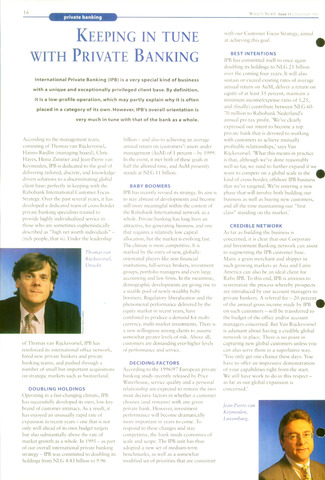Keeping in tune
with Private Banking
16
private banking
What's NfwS Issue 11 December 1997
International Private Banking (IPB) is a very special kind of business
with a unique and exceptionally privileged cliënt base. By definition,
it is a low-profile operation, which may partly explain why it is often
piaced in a category of its own. However, IPB's overall orientation is
very much in tune with that of the bank as a whole.
According to the management team,
consisting of Thomas van Rijckevorsel,
Hanno Riediin (managing board), Chris
Hayes, Heinz Zimmer and [ean-Pierre van
Keymeulen, IPB is dedicated to the goal of
delivering tailored, discrete, and knowledge-
driven solutions to a discriminating global
cliënt base: perfectly in keeping with the
Rabobank International Customer Focus
Strategy. Over the past several years, it has
developed a dedicated team of cross-border
private banking specialists trained to
provide highly individualized service to
those who are sometimes euphemistically
described as "high net worth individuals" -
(rich people, that is). Under the leadership
Thomas van
Rijckevorsel,
Utrecht.
of Thomas van Rijckevorsel, IPB has
reinforced its international office network,
hired new private bankers and private
banking teams, and pushed through a
number of small but important acquisitions
on strategie markets such as Switzerland.
DOUBLING HOLDINGS
Operating in a fast-changing climate, IPB
has successfully developed its own, low-key
brand of customer intimacy. As a result, it
has enjoyed an unusually rapid rate of
expansion in recent years - one that is not
only well ahead of its own budget targets
but also substantially above the rate of
market growth as a whole. In 1995 - as part
of our overall international private banking
strategy - IPB was committed to doubling its
holdings from NLG 4.43 billion to 9.96
billion - and also to achieving an average
annual return on (customers') assets under
management (AuM) of 1 percent - by 1999.
In the event, it met both of these goals in
half the allotted time, and AuM presently
stands at NLG 11 billion.
BABY BOOMERS
IPB has recently revised its strategy. Its aim is
to stay abreast of developments and become
still more meaningful within the context of
the Rabobank International network as a
whole. Private banking has long been an
attractive, fee-generating business, and one
that requires a relatively low capital
allocation, but the market is evolving fast.
The climate is more competitive. It is
marked by the entry of new, globally-
orientated players like non-financial
institutions, full-service brokers, investment
groups, portfolio managers and even large
accounting and law firms. In the meantime,
demographic developments are giving rise to
a sizable pool of newly-wealthy baby
boomers. Regulatory liberalization and the
phenomenal performance delivered by the
equity market in recent years, have
combined to produce a demand for multi-
currency, multi-market investments. There is
a new willingness among clients to assume
somewhat greater levels of risk. Above all,
customers are demanding ever-higher levels
of performance and service.
DECIDING FACTORS
According to the 1996/97 European private
banking study recently released by Price
Waterhouse, service quality and a personal
relationship are expected to remain the two
most decisive factors in whether a customer
chooses (and remains) with any given
private bank. However, investment
performance will become dramatically
more important in years to come. To
respond to these changes and stay
competitive, the bank needs economies of
scale and scope. The IPB unit has thus
adopted a new set of medium-term
benchmarks, as well as a somewhat
modified set of priorities that are consistent
with our Customer Focus Strategy, aimed
at achieving this goal.
BEST INTENTIONS
IPB has committed itself to once again
doubling its holdings to NLG 21 billion
over the coming four years. It will also
sustain or exceed existing rates of average
annual return on AuM, deliver a return on
equity of at least 15 percent, maintain a
minimum income/expense ratio of 1,25,
and (finally) contribute between NLG 60-
70 million to Rabobank Nederland's
annual pre-tax profit. 'We've clearly
expressed our intent to become a top
private bank that is devoted to working
with customers to achieve mutually
profitable relationships,' says Van
Rijckevorsel. 'What this means in practice
is that, although we've done reasonably
well so far, we need to further expand if we
want to compete on a global scale in the
kind of cross-border, offshore IPB business
that we've targeted. We're entering a new
phase that will involve both building our
business as well as buying new customers,
and all the time maintaining our "first
class" standing on the market.'
CREDIBLE NETWORK
As far as building the business is
concerned, it is clear that our Corporate
and Investment Banking network can assist
in augmenting the IPB customer base.
Many a grain merchant and shipper in
such growing markets as Asia and Latin
America can also be an ideal cliënt for
Rabo IPB. To this end, IPB is anxious to
systematize the process whereby prospects
are introduced by our account managers to
private bankers. A referral fee - 20 percent
of the annual gross income made by IPB f
on such customers - will be transferred to
the budget of the office and/or account
managers concerned. But Van Rijckevorsel
is adamant about having a credible global
network in place. There is no point in
capturing new global customers unless you
can also serve them in a superlative way.
'You only get one chance these days. You
have to offer an impressive demonstration
of your capabilities right from the start.
We still have work to do in this respect -
as far as our global expansion is
concerned.'
Jean-Pierre van
Keymeulen,
Luxemburg.

